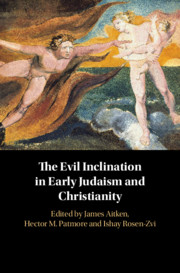Book contents
- The Evil Inclination in Early Judaism and Christianity
- The Evil Inclination in Early Judaism and Christianity
- Copyright page
- Contents
- Acknowledgments
- Contributors
- 1 Introduction
- 2 Reconsidering the Semantics of the “Inclination” (yeṣer) in Classical Biblical Hebrew
- 3 The “Inclination” (yeṣer) as Rendered in the Septuagint
- 4 “Fleshly Spirit” and “Vessel of Flesh” in 4QInstruction and the Thanksgiving Hymns
- 5 Theological Anthropology in the Enochic Tradition
- 6 The Perils of Philosophical Persuasion: Philo on the Origin of Moral Evils
- 7 The Evil Inclination (yeṣer ha-ra‘) in Tannaitic Literature: Demonic Desires and Beyond
- 8 Conflicting Intrapersonal Powers in Paul’s Letters
- 9 The “Two Inclinations” and the Double-Minded Human Condition in the Letter of James
- 10 An Evil Inclination in the Early Targums to the Pentateuch and Prophets?
- 11 “Gnostic” Theologies of Evil
- 12 The Rabbinic “Inclination” (yeṣer) and the Christian Apocrypha
- 13 Origen on the Origin of Sin
- 14 Augustine on the Diabolical Suggestion of Sin
- 15 Jerome and the “Inclination” (yeṣer): The Evidence of the Vulgate
- 16 Rabbinic Inclinations and Monastic Thoughts: Evagrius Ponticus’ Doctrine of Reasoning (logismoi) and Its Antecedents
- 17 “Inclination” (yaṣrā) in the Syriac Tradition
- 18 Evil, Sin, and Inclination (yeṣer) in Jewish and Christian Poetic Disputes between the Body and Soul
- 19 The Wizard of Āz and the Evil Inclination: The Babylonian Rabbinic Inclination (yeṣer) in Its Zoroastrian and Manichean Context
- 20 The Evil Inclination in the Targums to the Writings
- References
- Index of Names
- Index Locorum
16 - Rabbinic Inclinations and Monastic Thoughts: Evagrius Ponticus’ Doctrine of Reasoning (logismoi) and Its Antecedents
Published online by Cambridge University Press: 02 February 2021
- The Evil Inclination in Early Judaism and Christianity
- The Evil Inclination in Early Judaism and Christianity
- Copyright page
- Contents
- Acknowledgments
- Contributors
- 1 Introduction
- 2 Reconsidering the Semantics of the “Inclination” (yeṣer) in Classical Biblical Hebrew
- 3 The “Inclination” (yeṣer) as Rendered in the Septuagint
- 4 “Fleshly Spirit” and “Vessel of Flesh” in 4QInstruction and the Thanksgiving Hymns
- 5 Theological Anthropology in the Enochic Tradition
- 6 The Perils of Philosophical Persuasion: Philo on the Origin of Moral Evils
- 7 The Evil Inclination (yeṣer ha-ra‘) in Tannaitic Literature: Demonic Desires and Beyond
- 8 Conflicting Intrapersonal Powers in Paul’s Letters
- 9 The “Two Inclinations” and the Double-Minded Human Condition in the Letter of James
- 10 An Evil Inclination in the Early Targums to the Pentateuch and Prophets?
- 11 “Gnostic” Theologies of Evil
- 12 The Rabbinic “Inclination” (yeṣer) and the Christian Apocrypha
- 13 Origen on the Origin of Sin
- 14 Augustine on the Diabolical Suggestion of Sin
- 15 Jerome and the “Inclination” (yeṣer): The Evidence of the Vulgate
- 16 Rabbinic Inclinations and Monastic Thoughts: Evagrius Ponticus’ Doctrine of Reasoning (logismoi) and Its Antecedents
- 17 “Inclination” (yaṣrā) in the Syriac Tradition
- 18 Evil, Sin, and Inclination (yeṣer) in Jewish and Christian Poetic Disputes between the Body and Soul
- 19 The Wizard of Āz and the Evil Inclination: The Babylonian Rabbinic Inclination (yeṣer) in Its Zoroastrian and Manichean Context
- 20 The Evil Inclination in the Targums to the Writings
- References
- Index of Names
- Index Locorum
Summary
In a book exploring the Jewish concept of the Evil Inclination and its influence, a chapter focused on λογισμοί (roughly, “thoughts”) in the writings of Evagrius Ponticus might seem counterintuitive, at least initially: contemporary scholarship has preferred to search Evagrius’ writings for evidence of Classical and post-Classical Greek philosophy and, to a lesser extent, antecedent Christian literature. In terms of this agenda, exploring Evagrius’ connections with Jewish thinking would seem at best a low priority and at worst a fool’s errand. A minor, but typical, indication of these preconceptions at work can be seen in discussions regarding the attribution of a brief tract “On the Tetragrammaton” preserved in Christian scholia on Job.
- Type
- Chapter
- Information
- The Evil Inclination in Early Judaism and Christianity , pp. 247 - 261Publisher: Cambridge University PressPrint publication year: 2021

